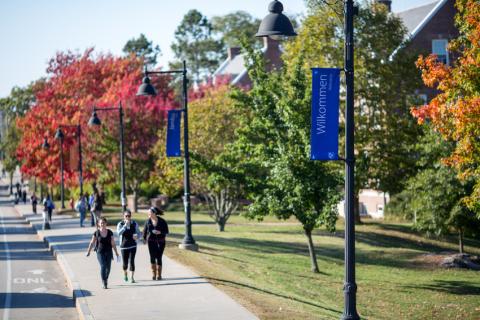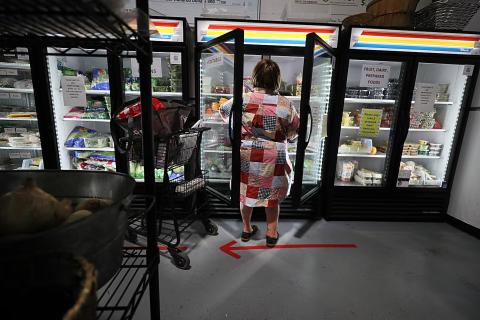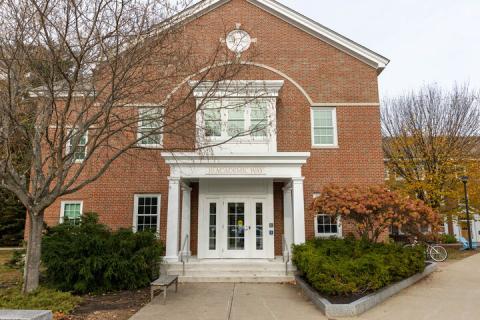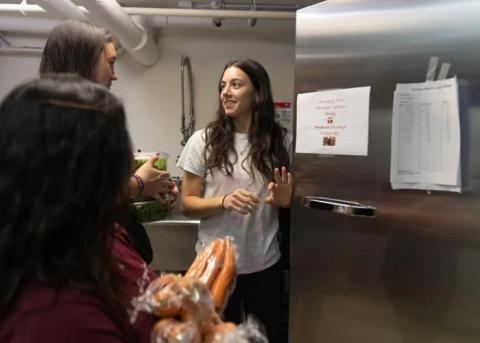"It is a fundamental human right to access resources necessary for survival and well-being."
Dr. Kenneth Holmes, Senior Vice Provost for Student Life at UNH
The Basic Needs program seeks to support students through prevention, intervention and emergency relief efforts. We acknowledge that the lack of basic needs is a systemic issue, not an individual one. Basic needs insecurity can stem from a variety of underlying factors, including income inequality, rising living expenses, and other issues. It is often not a result of personal choices or actions. We know how important it is for your basic needs to be met so you can focus on your education and other life goals.
In 2023, the National Postsecondary Student Aid Study (2020 NPSAS) released the first ever nationally representative estimates of food insecurity and homelessness affecting the nation's college students. In Spring 2020, for the first time, the study asked students questions to assess their experiences with food insecurity and homelessness. The sample includes students enrolled at any time between July 1, 2019, and June 30, 2020, at higher education institutions participating in federal financial aid programs. In total, 80,760 undergraduates completed surveys, a sample representing about 17.1 million undergraduates. In addition, 19,700 graduate students (representing 3.6 million) completed surveys.
As long suspected, the rates are higher for college students than the broader public and impacts every type of college and university as well as cuts across student demographics and even traditional measures of income and financial need. They found,
- 23% of undergraduates and 12% of graduate students experienced food insecurity
- 8% of undergraduates and 5% of graduate students experienced homelessness
- Basic Needs insecurity affects 35% of Black/African American Students, 30% of Native American students and 25% of Hispanic students
- Those at highest risk of basic needs insecurity include LGBTQ+ and Indigenous students.
Source: Food Insecurity and Homelessness in American Higher Education: An Overview of New Nationally Representative Estimates (2023)
History
"Students at UNH have needs that are both unique to them, and universal in scope: access to basic resources such as nutritious food, reliable shelter and more are on the forefront of the minds of those who interact with students every day — professors who teach classes, RAs and hall directors, dining staff, and more.
In 2019, UNH President James Dean initiated a Basic Needs Initiative Committee made up of dedicated faculty, staff and students to address basic needs concerns at the university. Through assessments, surveys and reports this committee was charged with looking at what UNH is doing, what else we could be doing and what we might need in order to implement or enhance any support.
This committee consolidated existing programs, created new programs and raised funds to support students’ basic needs. They also hired an AmeriCorps VISTA to support the creation of a new food pantry on campus and advocated for the hiring of a full-time staff member to support these important initiatives. The point of contact for basic needs programs became housed within the Dean of Students Office and in 2022, Patty Mathison was hired as the basic needs coordinator..." Read more about the Beginnings of Addressing Basic Needs in the UNH Magazine.
These resources and programs involve coordination of many different departments including Dining and Hospitality Services, Financial Aid, Student Accounts, Enterprise and Technology Services, Campus Services, UNH Housing and Residence Life, Advancement and Alumni Affairs among others. We are so grateful for the support, dedication and hard work put into meeting student basic needs.

Patty Mathison (she/her), Basic Needs Coordinator and Case Manager
I started as the inaugural Basic Needs Coordinator and Case Manager in April 2022 following 9 years serving as the Director for the Social Action and Integrative Learning office at George Mason University in Virginia. I've worked within higher education for most of my career in areas such as community engagement, community partnerships, social justice and leadership development where I created and oversaw scholarship programs, taught many leadership classes, coordinated living learning community programs as well as alternative breaks. Throughout my time in higher education, I always felt drawn to students facing basic needs insecurity and mental health challenges. I obtained my second Masters in Counseling and Development with a focus on Community Agency Counseling from George Mason University. I wanted to be able to do more to support students and was looking for a way to combine my experience within higher education with counseling and student support and this role was the perfect fit.
Throughout my experiences, I have witnessed and been in awe of the resiliency and determination of so many students. Many working, taking care of family and fighting to be able to get an education against significant odds. I have spent my career working to understand the root causes of so many social issues and how these systemic inequalities continue to be perpetuated. As we come out from the COVID pandemic, we are seeing a new wave of need with fewer resources and higher requests for resources. My hope is to connect students to resources while also acknowledging and sharing the challenges students face here at UNH. I believe in the power of community and believe everyone should have access to education.

Basic Needs Initiative Committee Members
- Patty Mathison, Basic Needs Coordinator and Case Manager (Chair)
- Dr. Catherine Moran, Director of Undergraduate Programs Sociology
- Dr. Michael Blackman, Dean of Students
- Jonathan Constable, Director of COLA Career and Professional Services
- Jes Crowell, Director of TRIO Scholars
- Lisa Enright, Assistant Dean of Student Success UNH-Manchester
- Gillissen (Gigi) Green, Academic and Cultural Engagement Specialist, OISS
- Hannah Harding, Assistant Director of Annual Giving
- Liz Hogan, Apartment Manager UNH Housing
- Crystal Joos, Assistant Director of Student Financial Services
- Chris Josefowitch, Student Senator
- Dr. Dovev Levine, Assistant Dean for Graduate Student Affairs
- Dorrie McClintock, Director of Conferences, Catering and Retail Services
- Candice Morey, Educational Program Coordinator, UNH Manchester Graduate School
- Shuva Paul, Graduate Teaching Assistant, OISS
- Dr. Dawna Perez, Executive Director, Student Success*
- Dana Pierce, Events Coordinator, UNH Manchester
- Dr. Shari Robinson, Assistant Vice Provost for Student Life*
- Elizabeth Stevens, Director of Student Financial Services
- Meg Marsh, Director of Annual Giving Programs
- Lisa Winters, Compensation Coordinator
Previous Committee Members
Jocelyne Bisson, UNH Student
Dr. Kimberly Babbitt, Associate Dean COLSA*
- Joel Carstens*, Associate Director of Financial Aid
- Megan Cramton, UNH Student
- Megan Davis, Chief of Staff
- Janet Dean, UNH First Lady*
- Liza Degenring, Graduate Student
- Kelsey Gilmore Garlington* Apartment Manager
- Dr. Joan Glutting, Inaugural Chair 2019-2023*, Clinical Professor, Psychology
- Dr. Kenneth Holmes, Senior Vice Provost for Student Life
- Rochelle L'Italien, UNH Dining Registered Dietician*Dr. Kenneth LaValley, Vice Provost, University Outreach and Engagement/Director of UNH Extension
- Dr. David May*, Associate Vice President for Business Affairs
- William (Bill) McNamara, Executive Director of Hospitality Services*
- Dr. David Mortensen*, Professor Agriculture, Nutrition & Food Systems
- Dr. Karen Spiller, Thomas W. Haas Professor in Sustainable Food Systems*
- Paul Young, AmeriCorps VISTA
Definitions:
Food Insecurity: Food insecurity refers to limited or uncertain availability of foods that are nutritionally adequate or safe, as well as a person's ability to obtain these foods in a socially acceptable way. Food insecurity is a systemic issue that can happen to anyone, not a personal failure. According to Feeding America's Elevating Voices Report, people facing hunger struggle with high living costs, expensive housing, unemployment, and low-wage jobs. Even people with a steady income and access to affordable housing can experience a temporary setback that leads to food insecurity, including job loss, medical emergency, natural disaster or family crisis.
Houseless or Unhoused: a person who lacks a consistent and safe nighttime residence. This can include couch surfing, staying temporarily with friends or family, a college student who does not have a consistent and safe place to go during school breaks, someone who stays in many different places, as well as staying in a homeless shelter, car, or sleeping outside. Visit this link to learn the difference between Homeless, Houseless or Unhoused
Housing Insecurity: Housing insecurity encompasses broader challenges related to a student's place of residence. These can include being unable to pay rent or utilities on time, occupying a residence with others beyond its official capacity, and moving three or more times in a given year. The most common challenge among college students facing housing insecurity was being able to afford the full amount of their rent, bills, and/or mortgage. Experiencing “housing instability” means having a place to live, but facing instability, uncertainty or unsuitability in one’s living conditions.
Person First Language : When referring to people who are without shelter, person-first language is important. For this issue, they will be described as a “person experiencing homelessness” instead of a “homeless person.” This is done as a reminder that their condition does not define them and that they are first and foremost a human being. It is important to emphasize that there is a broad range of experiences when it comes to people who are unhoused or without shelter. While the general public might think of houselessness primarily as people sleeping rough on the streets or within an encampment, there are also hidden components of houselessness. This includes those who “couch surf” temporarily with friends or family or the working houseless who live in their vehicles. Living without shelter generally is not a choice, and the experience is incredibly challenging.







